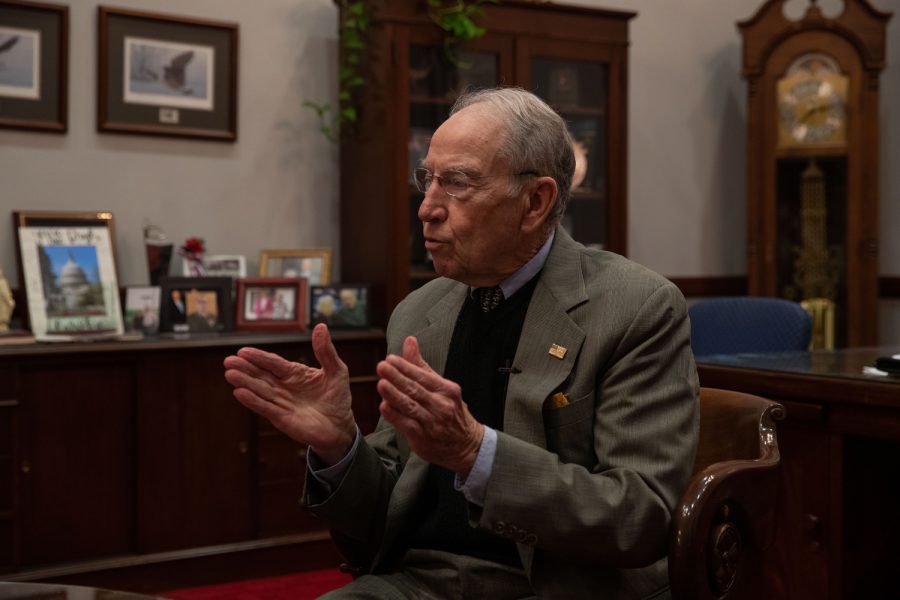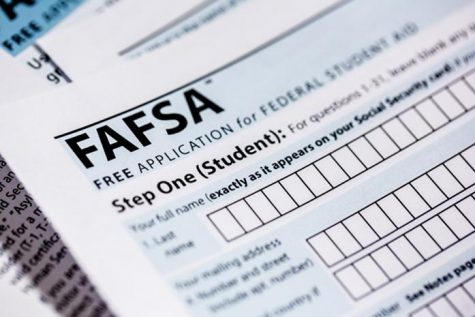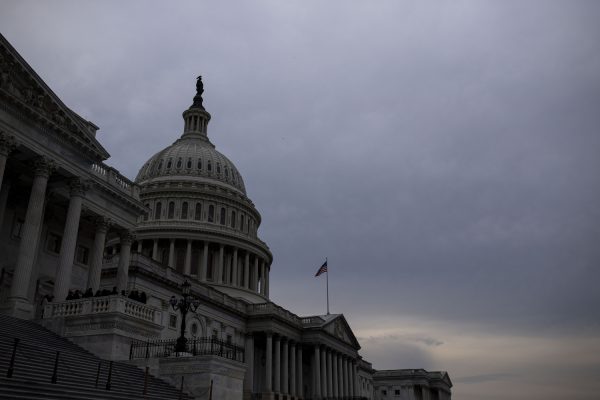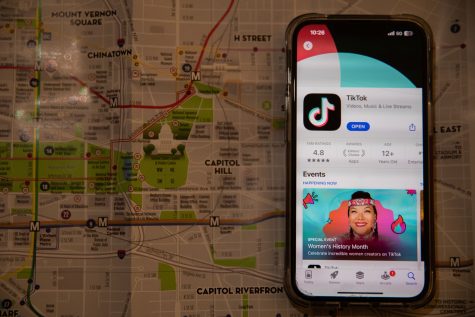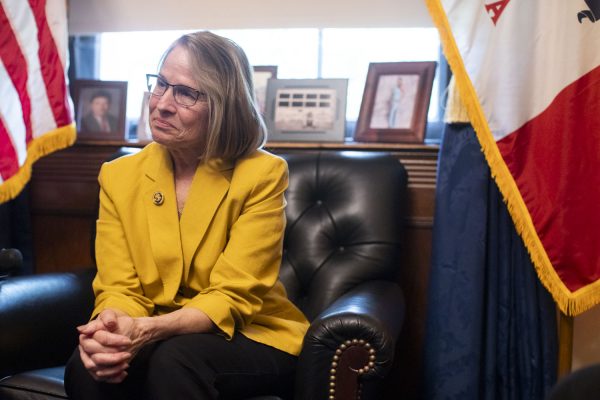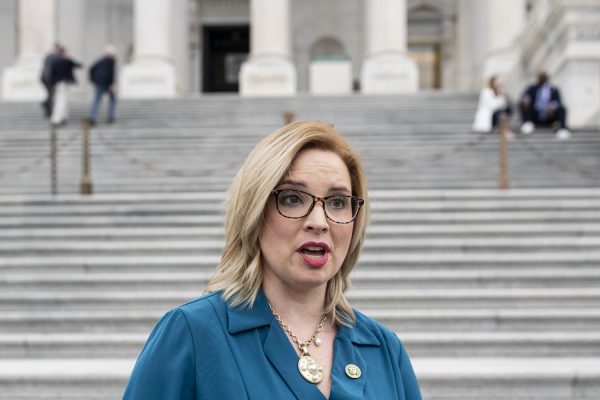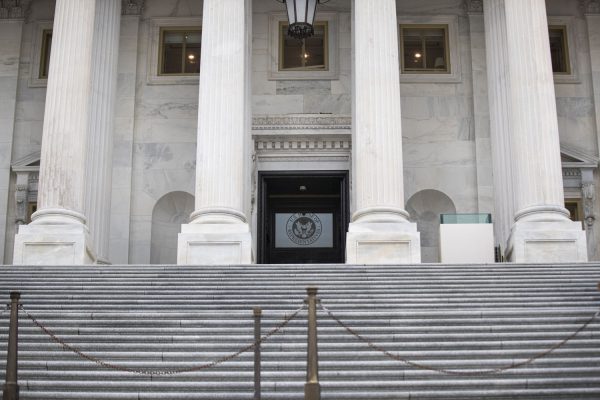Q&A | Sen. Chuck Grassley talks about bank protections, bipartisan legislation
During an interview with The Daily Iowan on Monday, Grassley said the Dodd-Frank legislation of 2010 will work for banks of under 50 million, despite the collapse of the Silicon Valley Bank.
Iowa senator Chuck Grassley is seen in his office in the Hart building in Washington D.C. The DI sat down with Grassley to discuss recent state and local legislation.
March 28, 2023
WASHINGTON — The Daily Iowan was in the nation’s capital Monday, where reporters met with Sen. Chuck Grassley and asked him about the Silicon Valley Bank, minority party representation, TikTok, and parental rights.
Editor’s Note: This interview has been edited for length and clarity.
The Daily Iowan: What can Congress do to better protect depositors from bank runs as we saw in Silicon Valley?
Sen. Chuck Grassley: I don’t know at this point. If this is the end of the situation, and I don’t know that it is, I don’t think we need to do anything now. But, I think that you look at what this bank did, having all of their capital in long-term government bonds, or high-value mortgages that when the interest rate was going up by the Fed, and then the value of those go down, that the bank wasn’t on top of it, and the regulators weren’t on top of it either.
So, I think the problems come because of bad bank management and because the regulators weren’t doing their job. Well, then I just read a story yesterday in the newspaper, that why wasn’t this bank sold over that, that long weekend and they gave a story that isn’t very clear why it was sold. But the implication was that if the government had acted faster, it probably could have been sold. We wouldn’t have to go through all of the sacrifices that you go through to protect the investors. But that’s all water over the bridge. So the government steps in. Will this protect all investments, all deposits, that they guaranteed here shortly? Is that going to continue well into the future? I think it would take legislation by Congress to do it. They have emergency powers where they stepped in, but I don’t think they can make the emergency powers permanent.
So right now, unless there was a need to increase the $250,000 deposit tax and that protection, I don’t think that anything needs to be done by Congress now. Now, maybe a week from now, you would interview me, and there’ll be new information, but that’s where I am right now.
The DI: Over the years, the regulatory framework has loosened and changed for large banks, do you think that those loose regulations contributed to Silicon Valley, do you think they should be more strict or should change?
Grassley: Now, let me ask you a question in return because I don’t want to find out … We have the Dodd-Frank legislation of 2010 or something like that, and then we changed it a little bit for smaller banks in 2018. So is it in regard to your question whether that 2018 legislation needs to be repealed or changed so that banks with lower capitalization would be covered to a great extent?
The DI: Yes.
Grassley: I don’t think so. And it had broad bipartisan support when it passed. And from that standpoint, I think there was a feeling that Dodd-Frank was needed for the really big banks in America, but wasn’t needed for banks of under 50 million, I believe. Yeah.
But here’s where I’m coming from. We don’t need to repeal that or go back and review that because it gives the Federal Reserve broad authority to put whatever sort of stipulations they need on those smaller banks to protect the investor and the depositor. So if the Feds doing their job, we shouldn’t have to change that legislation.
The DI: We’re gonna jump into talking about Iowa. So as a member of the minority party, what have you been doing to ensure that Iowans’ voices are heard and working with the house that is no longer in the minority? So how have you all been working together for Iowans?
Grassley: Well, we’ve gone through that before. 2011, 2012, 2013, and 2014 is an example. And then again. I guess what I’d have to say is that this process that we have, that we call a representative government, tends to work through all these problems. And I wouldn’t consider the fact that the house is Republican and the Senate is a Democrat any different now than it maybe was at other times in our history that that’s been the case.
So I think getting back to your question, how does that affect Iowa and my working for Iowans? I’m a member of the Senate. We’re in the minority. We were in the minority two years before that. I was in the majority for four years and I don’t think it changes much. You have to deal with the legislation that’s coming up now. And then you got to keep in touch with the Iowans. I think your question implies that.
We get daily reports on the phone calls that come into my office. I get a daily report on the emails and the postal mail coming into my office. Right now we’re about 3500 behind in answering, but I always keep track of those numbers that are more than 30 days old, and we have no email that’s more than 30 days old that we haven’t answered. And a lot of times it’s been just the opposite. Like when Trump was first elected president. Everybody was mad that he was president. One time we got 35,000 behind before we got caught up. And maybe we had 15,000 that were more than 30 days old. So you just live with what the situation is. But that mail is very important for keeping in touch with what your constituents are telling you and then the best way to do it.
I wouldn’t want to say that I get most of my information from my county meetings, but next week, you heard me say, I’m going to be, next two weeks, in 25 counties holding Q&As. And I learn some things from them. I always tell that group, this is the best way to do it because you’re gonna look at me and I can look at you. But, you get a small amount of opinion from, you know, maybe 100 people here and maybe 25 people the next meeting, and you don’t see as many people face to face as you deal with when you’re dealing with email and stuff like that.
And then I tried to follow my Twitter and my Instagram, Instagram doesn’t become so controversial, but Twitter does become controversial. So, I guess I was asked the same question by a group from Northern Iowa, the kid on the steps of the Capitol last week, and I say — it’s not a very sophisticated way to do it, but you put this all together plus what your research team does, working for me to keep me up on legislation or what I do myself to keep up on it comes out either yes or no.
Oh, and it’s not a very sophisticated way of telling you how you represent people but it’s all very important because if you’re gonna have a representative government there’s got to be a dialogue between those of us that are elected and our constituents, just like I’m having a dialogue with you here. And indirectly through your readers, to your readers.
The DI:
And I guess if you’re looking at different legislation that’s going on right now, is there anything bipartisan going through the Senate that would [specifically] benefit Iowans?
Grassley:
The Farm Bill. And the farm bill is very, a Farm Bill. Well, most legislation in the Senate has to be bipartisan or it’s never gonna get 60 votes to move ahead. Whereas in the House of Representatives, a majority party, Republican or Democrat, can ignore the minority as long as the majority sticks together, but not in the Senate. But regardless of whether the Senate is Republican or Democrat, the farm bills, every five years when they come up, are overwhelmingly bipartisan pieces of legislation.
And I would say that maybe only seven or 8 percent of the people in Iowa actually produce food, the 86,000 family farmers we have, but they’re very important for the other… Well, let’s say nationwide, two percent of the people produce the food for the other 98 percent. A pretty important part of the segment, but it doesn’t get much attention when you’re the 2 percent of the population. I’d say that that would be the first answer I’d give to your question.
Beyond that. Klobuchar and I are working on legislation to reform big tech when there’s economic discrimination by Apple and by Amazon when they promote their own product over the small businesses that use their platforms. Then, I think to Section 230, if I don’t have to explain that to you, where these platforms can’t be sued. I think that ought to be repealed, as an example, but I’m not working on a piece of legislation like that.
I just bring that up because it’s a bigger issue and Klobuchar and I are working on economic discrimination.
And then for me and Durban, I’ve been involved with him on sentencing reform. You know, it took us four years to get the First Step Act passed, which was signed by Trump [in] December 2018. But there’s some of that that we didn’t get done in that bill that we need to follow on or try to accomplish.
The Cantwell-Grassley — I almost feel like I need to explain PBMs to you because they’re so opaque there between the manufacturer and you folks as consumers, and nobody knows what they do. And yet they affect the price of pharmaceuticals tremendously. So the Cantwell-Grassley legislation that got out of committee last week, I’m not on that committee, got out 19 to nine. it would give the FTC a mandate that we expect you to look at this operation, as there’s anti-competitive activity to take action. Things like that.
The DI: And then we’re kind of switching gears a little bit. But, how is Congress evolving to work with Chinese companies, especially with a push for a TikTok ban?
Grassley: Well, TikTok would be one of those, and you probably saw on television, the same thing I did about what went on Saturday. If you want to talk, there isn’t much talk of bipartisanship in the House of Representatives over the long haul, But boy, if you looked at what Democrats were saying about TikTok and what Republicans are saying about it, there’s almost unanimity. Not completely, but almost unanimity among those people on that committee, that TikTok, shouldn’t be operating in the United States. I don’t know if that’s possible to get that legislation passed. If I could vote that way, I would vote that way.
But also, there’s another piece of legislation by Senator Warren and Senator Thune, and I don’t know whether there’s a bill in the house on this, but would give the Commerce Secretary authority under certain conditions and say, what could be operating in the United States or not as far as these platforms are concerned.
But what we’re concerned about is not only your privacy on TikTok but also how information may go to the Chinese Communist Party. That would affect our national security. And from that standpoint, when it comes to my personal property with these planets or personal privacy with these platforms, I’m not sure it really bothers me personally, but I think under our Constitution, your right to privacy is pretty important. And I ought to be concerned about it for other people, and I am concerned about it, but more concerned about national security and the extent to which China can get this information and what they do with it, I guess.
We may not be absolutely certain, but there’s a feeling that they can use this tool to spy on Americans and what they do with the information, maybe we don’t know now, but it ought to be a serious concern to any of us at the federal level, the government because the number one responsibility of the federal government is to protect the national security of Americans.
The DI: What are some of the specifics, whether it be TikTok specifically or platforms that use a similar thing, to minimize national security concerns?
Grassley:
If you said they couldn’t do business in the United States, that would take care of it. Now, another platform comes along and done similar things. I guess you’d want to make sure it’s not connected to the Chinese government because that’s where we’re focusing on with TikTok but I think with other platform issues, you get into a lot of other things other than just China.
I think you get into whether or not Apple ought to be doing business in China. And I guess we want American businesses to do business wherever they can. It was kind of irritating when the president or the CEO of Apple is over there now, or at least last week he was over there, and at the same time we’re talking about TikTok here and it looks like maybe they aren’t concerned about our relationship with China and the threat of China to the United States. That worries me. But, I want them to be able to do business wherever they can.
But you got to realize if you do business in China, you’re subject to the Chinese laws and if they want information from it, you’ve got to give it to them.
Now, there’s another, I believe in my answer to your question, just the platforms, I think you got to look. That’s kind of been a recent discussion about China. Long term, we’ve had the discussion of Russia stealing our intellectual property, and our trade secrets. And if you’re going to do business in China, maybe that’s what you got to submit to them. But also, if it’s not a voluntary agreement, that it is, we know over the long haul, that they’ve stolen our intellectual property and things like that.
The DI:
Yeah, and then we can switch gears again. So, in the House of Representatives, there’s currently a Parent’s Bill of Rights that’s working its way through the house right now. And we’re wondering if something like that ever came to the Senate, where would you stand? Would you express support? Would you vote for legislation of that type?
Grassley:
First of all, a proposition of mine is education is a state and local issue. Now, we’ve had the federal government involved in education going back to the Smith Hughes Act of World War I, and a lot of help for college education, or a lot of help for vocational education in our public schools, and things like that. So there’s been some federal government involved in education over a long period of time. But it’s been more about giving financial help to schools.
So, I’m more, it’s… I don’t think the bill is going to come up, and without studying exactly what the House did I think I want to not answer that question. Unless it is going to come up in the Senate, and it doesn’t look like it’s going to come up in the Senate because Schumer said it wouldn’t come up in the Senate.
So then what I tried to do is attack this administration where they have sent, they put out orders that the FBI ought to be concerned about people going to school board meetings, and expressing their views. And I’ve been very much opposed to what the attorney general has done in that area. Because I think you have a right under the Constitution to petition the government for the redress of grievances, freedom of association, free speech, to go to school board meetings, and express your views. And when you do this, all these things have to be done in a peaceful way.
But I think it’s very much a depressing, chilling effect, what the attorney general has done.
Hannah Pinski, Liam Halawith, Ashley Weil, and Emily Nyberg helped contribute to this report.



